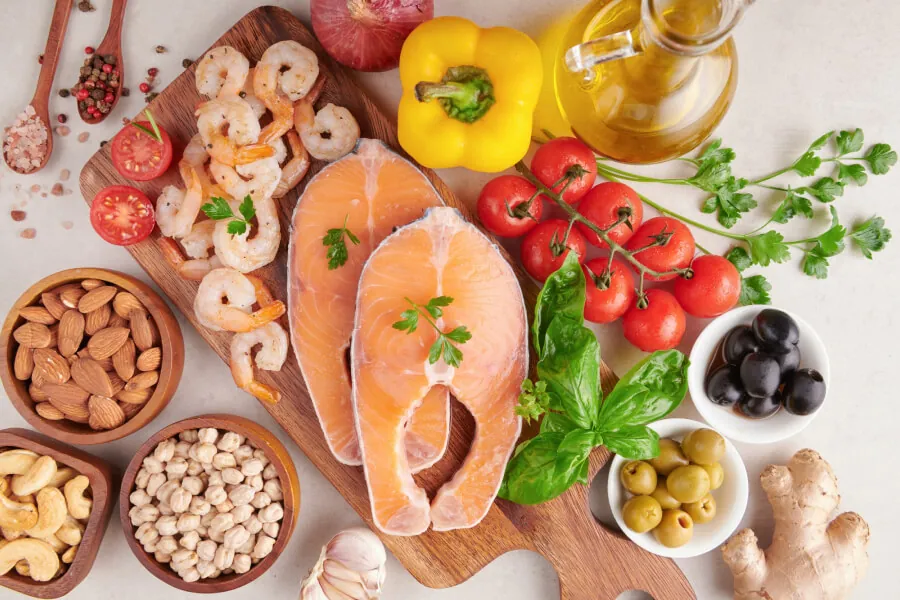Feeling constantly tired and dealing with muscle pain debilitating?
Good news: We’ve discovered some vitamins for fatigue and muscle pain but not any info you will read, you will know each vitamin role for your pain! Let’s dive in.
The Connection Between Fatigue, Muscle Pain, and Vitamin Deficiency
Fatigue and muscle pain often go hand in hand, and they can be symptoms of underlying health issues, including vitamin deficiencies.
Vitamins are crucial for numerous bodily functions, including:
- Energy production
- Muscle health
- overall vitality
If you’re not getting enough of these essential nutrients, then your body can’t perform optimally, leading to feelings of exhaustion and discomfort.
Understanding the Impact of Vitamins on Energy Levels
Without vitamins there is no energy metabolism!
As it helps to convert the food you eat into energy, maintain muscle function, and support overall physical health.
Without adequate vitamins, these processes can slow down, resulting in fatigue and muscle pain.
Identifying Symptoms of Vitamin Deficiency
Before diving into specific vitamins, it’s important to recognize the signs of deficiency. Common symptoms include:
- Persistent tiredness
- Muscle aches and cramps
- General weakness
- Poor concentration in life
- Irritability
If you’re experiencing these symptoms, it might be time to look at your vitamin intake. But don’t lose hope. Everything takes time! Let’s continue.
Role of Vitamin D in Energy Production and Muscle Function
Vitamin D, often called the “sunshine vitamin,” is important for your bone health, immune function, and muscle performance.
It helps regulate calcium and phosphorus levels in the blood, essential for strong bones and healthy muscles.
Moreover, vitamin D is crucial for energy production and can influence mood, potentially reducing feelings of fatigue and depression.
What are Vitamin D Sources? And What is the Recommended Intake?
Your body produces vitamin D when exposed to sunlight. However, due to lifestyle factors or geographic location, many people don’t get enough sunlight exposure. In such cases, dietary sources and supplements become important. Foods rich in vitamin D include:
- Fatty fish (salmon, mackerel, sardines)
- Fortified dairy products and plant-based milk
- Egg yolks
The recommended daily intake of vitamin D varies, but generally, 600-800 IU (International Units) is suggested for most adults. Always consult with a healthcare provider before starting supplements to determine the right dosage for you.
Benefits of B Vitamins in Energy Support
The B vitamin complex includes eight essential vitamins that work together to convert food into energy, support brain function, and maintain cell health. These vitamins are particularly effective at combating fatigue and improving mood.
- Vitamin B1 (Thiamine): Helps convert nutrients into energy.
- Vitamin B2 (Riboflavin): Plays a role in energy production and cellular function.
- Vitamin B3 (Niacin): Supports metabolism and DNA repair.
- Vitamin B5 (Pantothenic Acid): Essential for hormone production and energy metabolism.
- Vitamin B6 (Pyridoxine): Crucial for amino acid metabolism and neurotransmitter production.
- Vitamin B7 (Biotin): Important for fat, carbohydrate, and protein metabolism.
- Vitamin B9 (Folate): Necessary for DNA synthesis and repair.
- Vitamin B12 (Cobalamin): Vital for nerve function and the production of red blood cells.
What food Contains Vitamin B?
To ensure you’re getting enough B vitamins, Add the following foods into your diet:
- Whole grains
- Meat (especially liver)
- Eggs
- Dairy products
- Legumes
- Nuts and seeds
- Leafy green vegetables
If dietary intake isn’t sufficient, B-complex supplements can be beneficial. They’re readily available and can help fill any nutritional gaps.
Magnesium’s Role in Muscle Relaxation and Boosting Energy
Magnesium is a critical mineral involved in over 300 biochemical reactions in the body. It aids in muscle relaxation, reduces cramps, and supports energy production. Low levels of magnesium can lead to muscle spasms, fatigue, and even chronic pain.
Natural Sources of Magnesium and Supplement Guidelines
To boost your magnesium intake, focus on these foods:
- Dark leafy greens (spinach, kale)
- Nuts and seeds (almonds, pumpkin seeds)
- Whole grains
- Fish (mackerel, tuna)
- Avocado
The recommended daily allowance for magnesium is about 310-420 mg for adults, depending on age and sex. Supplements are also available, but it’s best to consult with a healthcare provider to determine the right dosage.
Iron – Essential for Oxygen Transport and Fatigue Reduction
Iron is essential for the production of hemoglobin, a protein in red blood cells that transports oxygen throughout the body. Without enough iron, your muscles and tissues don’t get adequate oxygen, leading to fatigue and muscle weakness.
Dietary Sources of Iron and Recommendations for Supplementation
Iron-rich foods include:
- Red meat
- Poultry
- Fish
- Lentils
- Beans
- Tofu
- Spinach
The recommended daily intake of iron is 8 mg for men and 18 mg for women, though it can be higher for pregnant women. If you suspect an iron deficiency, it’s important to get tested and consider supplements if necessary.
How to Add Vitamins in Your Daily Routine?
Creating a Balanced Diet to Combat Fatigue and Muscle Pain
A balanced diet rich in vitamins and minerals is key to maintaining energy levels and muscle health. Here are some tips to help you incorporate essential vitamins into your daily routine:
- Eat a variety of foods: Ensure your diet includes a mix of fruits, vegetables, whole grains, protein sources, and healthy fats.
- Plan your meals: Prepare balanced meals ahead of time to avoid relying on processed foods.
- Stay hydrated: Drink plenty of water throughout the day, as dehydration can exacerbate fatigue and muscle pain.
When to Consider Vitamin Supplements for Optimal Energy Levels
While it’s best to get your vitamins from food, supplements can be helpful if you’re not able to meet your nutritional needs through diet alone. Consider supplements if:
- You have dietary restrictions (e.g., vegetarian or vegan diets).
- You have a medical condition that affects nutrient absorption.
- You’re pregnant or breastfeeding and have higher nutritional needs.
Always consult with a healthcare provider before starting any new supplement regimen.
Conclusion
Incorporating the right vitamins into your diet can make a significant difference in your energy levels and muscle health. By ensuring adequate intake of Vitamin D, B vitamins, magnesium, and iron, you can combat fatigue and alleviate muscle pain naturally. These essential nutrients not only support your body’s vital functions but also enhance your overall well-being.
Living a vibrant, energetic life is within your reach. Start by evaluating your diet and identifying any potential deficiencies. Embrace a balanced diet rich in diverse, nutrient-dense foods, and consider supplements when necessary to fill in any gaps. Remember, small changes in your nutritional habits can lead to profound improvements in how you feel every day.
If you’re ready to boost your energy and reduce muscle pain, take action today by integrating these essential vitamins into your routine. For personalized advice and to ensure you’re meeting your specific needs, consult with a healthcare provider.
FAQs
What are the best vitamins for boosting energy and reducing fatigue?
The best vitamins for boosting energy and reducing fatigue include Vitamin D, B vitamins (especially B12 and B6), magnesium, and iron.
How do vitamins play a role in reducing muscle pain and soreness?
Vitamins support muscle function, reduce inflammation, and aid in muscle repair and relaxation, which helps reduce muscle pain and soreness.
Can vitamin deficiencies lead to chronic fatigue and muscle pain?
Yes, deficiencies in vitamins like Vitamin D, B vitamins, magnesium, and iron can lead to chronic fatigue and muscle pain.
What is the recommended daily intake of vitamins to combat fatigue and muscle pain?
Recommended daily intakes are: Vitamin D: 600-800 IU, Vitamin B12: 2.4 mcg, Magnesium: 310-420 mg, Iron: 8 mg for men and 18 mg for women
How can I naturally increase my vitamins for fatigue and muscle pain?
You can naturally increase your vitamins for fatigue and muscle pain by intaking by eating a balanced diet rich in fruits, vegetables, whole grains, lean proteins, and healthy fats.







